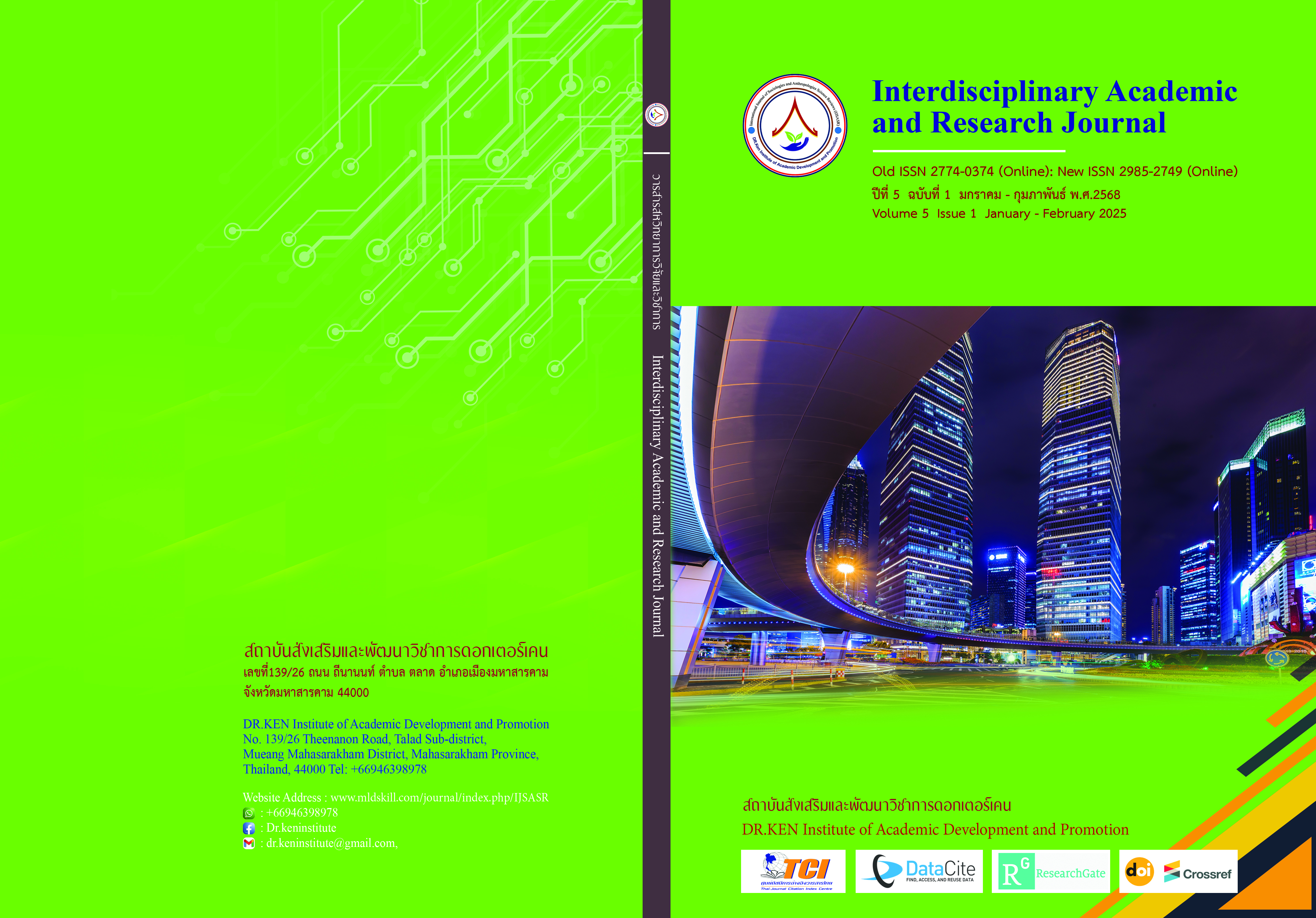Factor Analysis of Competency as a Professional Teacher in the New Era of Students Practicing Professional Teacher Experiences Faculty of Education Ramkhamhaeng University
DOI:
https://doi.org/10.60027/iarj.2025.278600Keywords:
Factor analysis, Competency teacher, Professional teacherAbstract
Background and Aims: The Faculty of Education, Ramkhamhaeng University able to effectively promote, support, and develop students practicing teaching professional experience to have the competency of being a professional teacher in the modern era. To develop students for quality and success in the future. The objectives of the study are threefold: (1) study the competency as a professional teacher in the New Era of Students Practicing Professional Teacher Experiences Faculty of Education Ramkhamhaeng University; and (2) analyze the exploratory components of the modern professional teacher in the New Era of Students Practicing Professional Teacher Experiences Faculty of Education Ramkhamhaeng University.
Methodology: The research utilizes a mixed-methods approach, incorporating both quantitative and qualitative research methods. The sample group is the student teachers of the Faculty of Education at Ramkhamhaeng University, totaling 400 students and 10 experts for providing interview data. The research tools consisted of an interview form and a questionnaire on the competency of a modern professional teacher. Statistics used in data analysis were mean, standard deviation, and factor analysis.
Results: This research found that 1) The results of the study on the competency as a professional teacher in the New Era of Students Practicing Professional Teacher Experiences Faculty of Education Ramkhamhaeng University found that the overall average. at a high level (M=4.01, SD=0.56) 2) The results of the survey component analysis of the competency of modern professional teachers. of students practicing teacher professional experience Faculty of Education Ramkhamhaeng University consists of 5 components: (1) the factor of learning management; (2) the factor of morality professional ethics; (3) the factor of measurement and evaluation; (4) the factor of research and development; and finally (5) the factor of professional engagement. The eigenvalues of these five factors were equal to 8.301, 7.378, 4.717, 3.862, and 3.364 respectively, and the percentage of variance was equal to 20.752, 18.446, 11.793, 9.656, and 8.410 respectively. The weighted value of the factor was between 0.527 and 0.906
Conclusion: The results of the study focused on the competency as a professional teacher in the New Era of Students Practicing Professional Teacher Experiences Faculty of Education Ramkhamhaeng University In using the science and art of being a professional teacher to prepare you for confidence and effective teaching professional experience.
References
กุลิสรา จิตรชญาวณิช. (2561). การศึกษาและความเป็นครูไทย. พิมพ์ครั้งที่ 2. สำนักพิมพ์จุฬาลงกรณ์มหาวิทยาลัย.
ข้อบังคับคุรุสภาว่าด้วยมาตรฐานวิชาชีพ พ.ศ. 2556 (2556, 4 ตุลาคม). ราชกิจจานุเบกษา, เล่ม 130 ตอนพิเศษ 130 ง. หน้า 65-71.
ข้อบังคับคุรุสภาว่าด้วยมาตรฐานวิชาชีพ พ.ศ. 2562 (2562, 20 พฤษภาคม). ราชกิจจานุเบกษา, เล่ม 136 ตอนพิเศษ 68 ง. หน้า 18-20.
จุฑารัตน์ คชรัตน์, วิชุนา สัตยารักษ์, ณัฐกา นาเลื่อน, วิภาวี มณีเนตร และชูศักดิ์ นพถาวร. (2561). สมรรถนะความเป็นครูมืออาชีพของนักศึกษาหลักสูตรประกาศนียบัตรบัณฑิตวิชาชีพครู มหาวิทยาลัยหาดใหญ่. Retrieved on May 30, 2023 from: https://ca.hu.ac.th/wp-content/ uploads/2022/10/ครูมืออาชีพณัฐกานาเลื่อน.pdf
ฉัตรชัย หวังมีจงมี และองอาจ นัยพัฒน์. (2560). สมรรถนะของครูไทยในศตวรรษที่ 21: ปรับการเรียนเปลี่ยนสมรรถนะ. วารสารสถาบันเสริมศึกษาและทรัพยากรมนุษย์ มหาวิทยาลัยธรรมศาสตร์, 12(2), 47-63. http://www.journalhri.com/pdf/1202_03.pdf
ธวชินี โรจนาวี. (2554). เส้นทางการเป็นครูแห่งชาติ: การวิจัยพหุกรณีศึกษา. ภาควิชาวิจัยการศึกษา จุฬาลงกรณ์มหาวิทยาลัย.
พระมงคลธรรมวิธาน, พระครูสิริธรรมนิเทศ และประสิทธิ์ สระทอง. (2561). ครูมืออาชีพสู่การเรียนรู้แบบมืออาชีพ. Veridian E-Journal, Silpakorn University, 11(1), 2486-2499. https://he02.tci-thaijo.org/index.php/Veridian-E-Journal/article/view/121794/93487
พฤทธิ์ ศิริบรรณพิทักษ์, เพ็ญวรา ชูประวัต, ชญาพิมพ์ อุสาโห, สุกัญญา แช่มช้อย, สืบสกุล นรินทรางกูร ณ อยุธยา, ฐาปนี วงศ์พรหมและคณะ. (2561) การพัฒนากลไกขับเคลื่อนระบบการผลิตและพัฒนาครูสมรรถนะสูง สำหรับประเทศไทย 4.0. พริกหวานกราฟฟิค.
พิชญาภา ยืนยาว และธีวุธ ธาดาตันติโชค. (2561). การวิเคราะห์องค์ประกอบคุณลักษณะของครูมืออาชีพในศตวรรษที่ 21. สาขาวิชาการบริหารการศึกษา คณะครุศาสตร์ มหาวิทยาลัยราชภัฏนครปฐม.
พิณสุดา สิริธรังศรี. (2557). การยกระดับคุณภาพครูไทยในศตวรรษที่ 21. มาตาการพิมพ์.
พิมพันธ์ เดชะคุปต์ และพเยาว์ ยินดีสุข. (2557). การจัดการเรียนรู้ในศตวรรษที่ 21. สำนักพิมพ์จุฬาลงกรณ์มหาวิทยาลัย.
ไพฑูรย์ สินลารัตน์. (2559). การศึกษา 4.0 เราต้องแปลงกับดักให้เป็นความหวังดี การศึกษา 4.0 เป็นยิ่งกว่าการศึกษา. โรงพิมพ์แห่งจุฬาลงกรณ์มหาวิทยาลัย.
รักษิต สุทธิพงษ์. (2560). กระบวนทัศน์ใหม่ทางการศึกษากับการพัฒนาครูไทยในยุคดิจิตอล. วารสารศึกษาศาสตร์ มหาวิทยาลัยนเรศวร, 19(2), 344-355. https://so06.tci-thaijo.org/index.php/edujournal_nu/article/view/89933/70684
วิจารณ์ พานิช. (2555). การเรียนรู้ครูเพื่อศิษย์ในศตวรรษที่ 21. มูลนิธิสดศรีสฤษดิ์วงศ์.
สมหวัง พิธิยานุวัฒน์, เพชรา พิพัฒน์สันติกุล, จักรกฤษณ์ สำราญใจ, เปรมใจ เอื้ออังกูล, วนิดา แสงสารพันธ์, และณัฏฐภรณ์ หลาวทอง. (2555). รายงานการวิจัยเพื่อจัดระดับคุณภาพเขตพื้นที่การศึกษา. สำนักงานเลขาธิการสภาการศึกษา.
สำนักงานเลขาธิการคุรุสภา. (2562). กรอบสมรรถนะครูเอเชียตะวันออกเฉียงใต้ (ซีทีซีเอฟ). สำนักเลขาธิการคุรุสภา.
สำนักงานเลขาธิการสภาการศึกษา. (2560). ระบบและรูปแบบการพัฒนาครูที่เหมาะสมกับสังคมไทยและความเป็นสากล. พริกหวานกราฟฟิค.
Baratov, N. (2016). Formation of professional orientation of students pedagogical college using pedagogical practice. The Advanced Science Journal, (2), 79-82. http://advancedscience.org/2016/2/079-082.pdf
Benjamin, D., Brown., Rolanda, S., Horn., Gwendolyn, King. (2018). The effective implementation of professional learning communities. Alabama Journal of Educational Leadership, (5), 53-59. https://eric.ed.gov/?id=EJ1194725
Cronbach, L. J. (1990). Essentials of psychological testing. 5th edition. Harper Collins Publishers.
Hair, J., Black, W., Babin, B., & Anderson, R. (2010). Multivariate data analysis from a global perspective. Hamilton Printing Co.
Hayward, L. (2015). Assessment is learning: The preposition vanishes. Assessment in Education: Principles, Policy and Practice, 22(1), 27-43.https://doi.org/10.1080/969594X.2014.984656
Hord, S. M. (1997). Professional Learning Communities: Communities of Continuous Inquiry and Improvement. Southwest Educational Development Laboratory.
Oxford University Press. (2017). Oxford Dictionaries. Retrieved April 30, 2023, from http://oxforddictionaries.com/definition/english/research?q=research
Schwimmer, M., & Maxwell, B. (2017). Codes of ethics and teachers’ professional autonomy. Ethics and Education, 12(2), 141-152. https://doi.org/10.1080/17449642.2017.1287495
Wilson, A. (2016). From professional practice to practical leader: Teacher leadership in professional learning communities. International Journal of Teacher Leadership, 7(2), 45-62. https://eric.ed.gov/?id=EJ1137497
Downloads
Published
How to Cite
Issue
Section
License
Copyright (c) 2025 Interdisciplinary Academic and Research Journal

This work is licensed under a Creative Commons Attribution-NonCommercial-NoDerivatives 4.0 International License.
Copyright on any article in the Interdisciplinary Academic and Research Journal is retained by the author(s) under the under the Creative Commons Attribution-NonCommercial-NoDerivatives 4.0 International License. Permission to use text, content, images, etc. of publication. Any user to read, download, copy, distribute, print, search, or link to the full texts of articles, crawl them for indexing, pass them as data to software, or use them for any other lawful purpose. But do not use it for commercial use or with the intent to benefit any business.
















.png)


